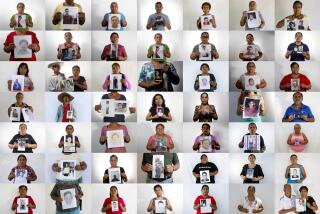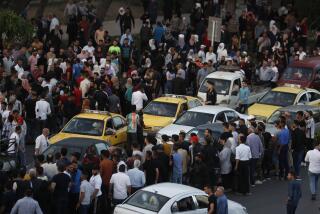Adding to Kashmir’s Agony: The Missing
- Share via
SRINAGAR, India — Samia Nabi holds tightly to the memory of her big brother walking her to school, hand in hand.
“He would help me with my homework, and since my mother was sick at that time, give me my baths, comb my hair and press my school uniform,” said Samia, 15, wiping away tears. “He spoiled me too much, since I was his littlest sister.”
Samia’s brother, Javed Ahanger, disappeared on Aug. 18, 1990. He is one of an estimated 2,500 men and boys missing since Islamic militants took up arms in India-ruled Kashmir 11 years ago.
Human rights activists believe most were picked up by Indian security forces on suspicion of having ties to the militants.
Javed, 16, was spending the night with a cousin across the street when his mother was awakened by shouting 3 a.m. She peeked out her window and saw her son being thrown into a Jeep.
“I started wailing, but the neighbors said, ‘Don’t worry, your son is not a militant and he will be released,’ ” said Parveena Akhter, 44.
“I’ve been looking for him ever since.”
Akhter has filed cases with the Jammu-Kashmir state human rights commission and the federal Home Ministry in New Delhi.
“But they said three high-ranking officers were involved, so there was nothing they could do,” said Akhter, sitting on a Muslim prayer rug, drying tears with her green paisley headscarf, her eyes illuminated by a kerosene lantern for lack of electricity.
Akhter heads the Assn. of Parents of Disappeared Persons. Women pad barefoot in and out of her sitting room, its turquoise walls covered with black and white photos of her son, to offer support and update her on their cases.
Raja Begum claims she could hear her 16-year-old son being beaten unconscious as three soldiers held her at gunpoint.
“I could hear him scream, ‘Mother, Mother, Mother,’ and telling them that he didn’t have any weapons,” said Begum, a 40-year-old widow and mother of five other children.
She said neighbors saw her son, Nisar Ahmad Wani, thrown naked into a ditch. But when she went searching for him, he was gone.
“I am hopeful that whatever they did to him, he is not alive and did not suffer anymore,” said Begum.
Kashmir’s inspector general of police, Ashok Bhan, denies reports that most of the disappeared were taken by Indian soldiers or Kashmiri officers who work for the government.
He said some 5,000 youngsters had gone over the border to Pakistan to train in “terrorist camps” since the insurgency began.
“The boys who are militants are the ones who are missing,” he said. “We feel they have gone across for training, or they may have been killed on the border.”
Bhan also accused militants of dressing up in Indian military uniforms and killing young men “to bring a bad name to the police and military.”
Parvez Imroz, a human rights attorney for the parents’ association, said none of his cases has been successful.
He named three colleagues murdered while working for the cause.
Sipping tea at the Jammu-Kashmir High Court between hearings, Imroz said Indian security forces are immune from prosecution unless indicted by the interior minister.
“Impunity is the greatest factor behind the human rights violations,” he said. “My stand is that not only the security forces but the excesses of the armed opposition groups should be exposed.”
More to Read
Sign up for Essential California
The most important California stories and recommendations in your inbox every morning.
You may occasionally receive promotional content from the Los Angeles Times.













